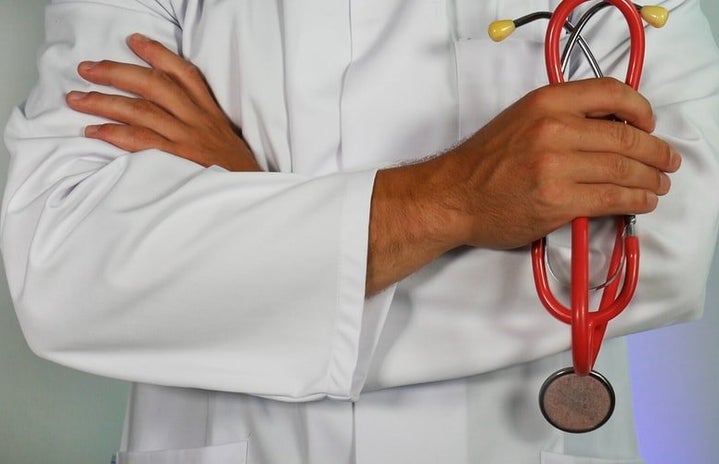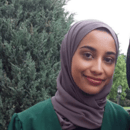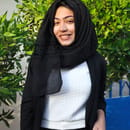Health professionals are some of the most trusted people in your life. After all, they help keep you healthy and alive. But for many people, particularly higher-weight people, going in for a regular check-up can be dreadful. Last month, when my mother and I went to the walk-in clinic near our house, I left feeling worse than when I went in.
During the visit, my mother mentioned to the doctor how she was concerned about my weight. She mentioned that I was very thin and asked if there might be a hormonal imbalance or some underlying issue. I said nothing. Conversations about my weight make me uncomfortable. Though, instead of looking into my mother’s concerns, the doctor brushed it off and said it’s fine. But my mother didn’t give up; she brought it up again. Though, this time the doctor gave her a straight answer: “It’s better to be thin than fat.”
The ideology that ‘skinny equals healthy’ is not just isolated to medical professionals, rather it’s more of a societal trend. The issue is that this bias and societal expectation sometimes seep into the medical profession and it can be incredibly dangerous for patients.
Ary Maharaj, the outreach and education coordinator at the National Eating Disorder Information Centre (NEDIC), said that clients of NEDIC say that the fear of having to face weight stigma is a key reason why many living in higher-weight bodies avoid healthcare altogether.
Maharaj said health professionals like weight because weight can give you a distinct number and is easily determined. It’s a quick and easy ‘solution.’
Mariam Nouser, a 25-year-old who lives in Brampton, said that as a child, she used food to cope with her parents’ divorce. After eating, she would work out profusely.
Growing up, she felt “fat-shamed” by health professionals because they were quick to say ‘you’re overweight’ and ‘you need to lose weight’.
Nouser said she was once told by a doctor that ‘no eleven-year-old should be this weight.’
Amna Iqbal, 19 who lives in Washington state, said the weight bias with health professionals started when she was 15.
“I went to the doctor and she told me to eat ‘healthier’ portion sizes.” What she meant was to eat smaller portion sizes. Iqbal said the doctor showed, with her hands, the portion sizes Iqbal should’ve been eating.
Iqbal said the portion size was less than a quarter of a plate.
“I felt so bad because I was already not eating much at the time and I told her that. But she brushed it off and said to eat less anyway.”
Maharaj said, “These [weight biased] comments act as fuel for those thoughts in your mind because statements from healthcare professionals carry a lot of importance.”
“There were times when I would feel dizzy and get hunger headaches because I was doing what the doctor told me to do: I was eating less and sometimes nothing at all.”
In a 2014 study by a Centre for Student Development and Counselling, Ryerson University, medical residents reported receiving fewer than 5 hours of training in eating disorder assessment and treatment practices.

Iqbal said she started to feel frustrated when things didn’t change even after taking the doctor’s advice.
“I was blaming myself for [eating]. Even though the issue was a medical [concern] and it was out of my hands but it hadn’t been diagnosed.”
Iqbal was diagnosed with polycystic ovary syndrome (PCOS) when she was 17. PCOS is a hormonal disorder that often causes patients to have a higher weight.
Fearing the Black Body: The Racial Origins of Fat Phobia, a book by Sabrina Strings, talks about how, since the beginnings of the slave trade, white societal trends began blacklisting Black bodies by associating them with uncontrollable eating habits. It was a colonial ideology pressured into society.
Nouser said that as a Muslim, racialized woman, she feels that being a higher weight is that much harder.
Nouser said she feels that this weight bias disproportionately affects women because women are expected to look a certain way and also to have their weight at a certain acceptable number.
“There are these societal ideals for women to look a certain way so, for women, I feel doctors look at weight through a different lens.”
Nouser said walk-in clinics are especially hard because doctors don’t have her health history and usually say, ‘you need to lose weight.’ She said she feels they make “assumptions about [her] weight.”
In August, for the first time, the Canadian Clinical Practical Guidelines for adult obesity management included a chapter about weight bias and stigma.
The key recommendations include first asking permission to discuss weight, assessing patients’ stories and assisting with barriers and drivers of weight gain.
Nouser said that weight stigma has carried on through her pregnancy. “At 34 weeks pregnant, an anesthesiologist called me and said that I was at higher risk for c-section, even though I’m lighter than when I first got pregnant. So basically based on a number on my chart he made an assumption.”
She said the stigma she faces only adds to the already difficult changes that pregnancy brings.
NEDIC provides information, resources, referrals and support to Canadians affected by eating disorders. Toll Free – 1-866-633-4220. Toronto – 416-340-4156.



